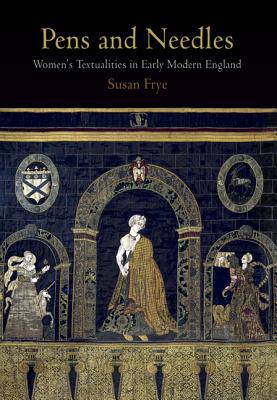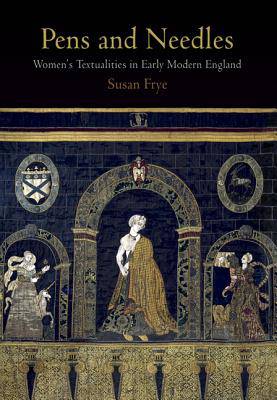
- Retrait gratuit dans votre magasin Club
- 7.000.000 titres dans notre catalogue
- Payer en toute sécurité
- Toujours un magasin près de chez vous
- Retrait gratuit dans votre magasin Club
- 7.000.0000 titres dans notre catalogue
- Payer en toute sécurité
- Toujours un magasin près de chez vous
Description
The Renaissance woman, whether privileged or of the artisan or the middle class, was trained in the expressive arts of needlework and painting, which were often given precedence over writing. Pens and Needles is the first book to examine all these forms as interrelated products of self-fashioning and communication.
Because early modern people saw verbal and visual texts as closely related, Susan Frye discusses the connections between the many forms of women's textualities, including notes in samplers, alphabets both stitched and penned, initials, ciphers, and extensive texts like needlework pictures, self-portraits, poetry, and pamphlets, as well as commissioned artwork, architecture, and interior design. She examines works on paper and cloth by such famous figures as Elizabeth I, Mary, Queen of Scots, and Bess of Hardwick, as well as the output of journeywomen needleworkers and miniaturists Levina Teerlinc and Esther Inglis, and their lesser-known sisters in the English colonies of the New World. Frye shows how traditional women's work was a way for women to communicate with one another and to shape their own identities within familial, intellectual, religious, and historical traditions. Pens and Needles offers insights into women's lives and into such literary texts as Shakespeare's Othello and Cymbeline and Mary Sidney Wroth's Urania.Spécifications
Parties prenantes
- Auteur(s) :
- Editeur:
Contenu
- Nombre de pages :
- 344
- Langue:
- Anglais
- Collection :
Caractéristiques
- EAN:
- 9780812222524
- Date de parution :
- 20-05-13
- Format:
- Livre broché
- Format numérique:
- Trade paperback (VS)
- Dimensions :
- 178 mm x 251 mm
- Poids :
- 771 g

Les avis
Nous publions uniquement les avis qui respectent les conditions requises. Consultez nos conditions pour les avis.






